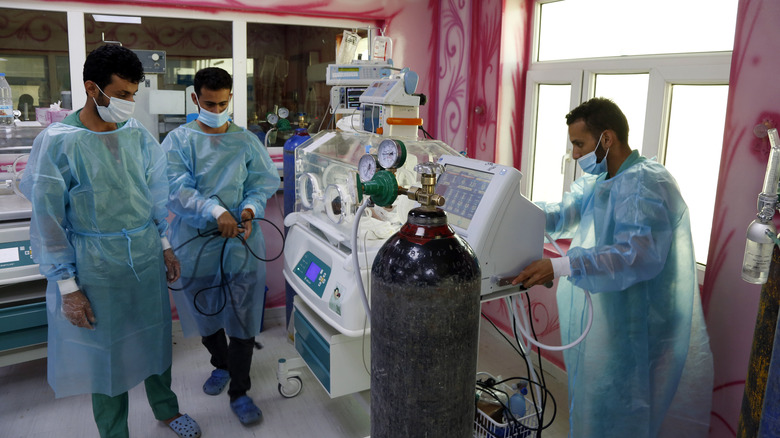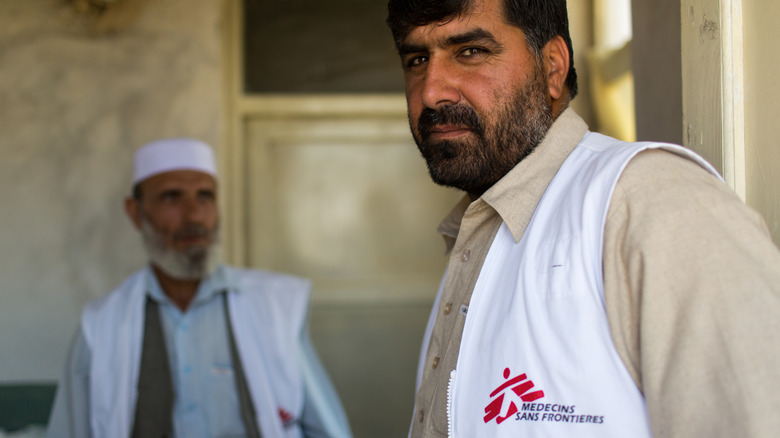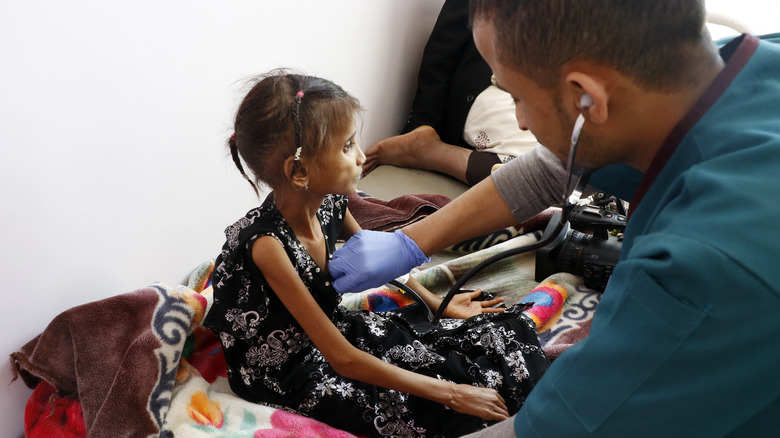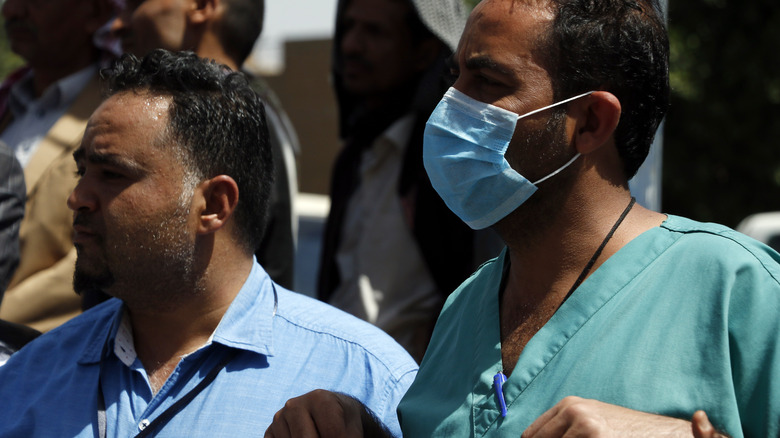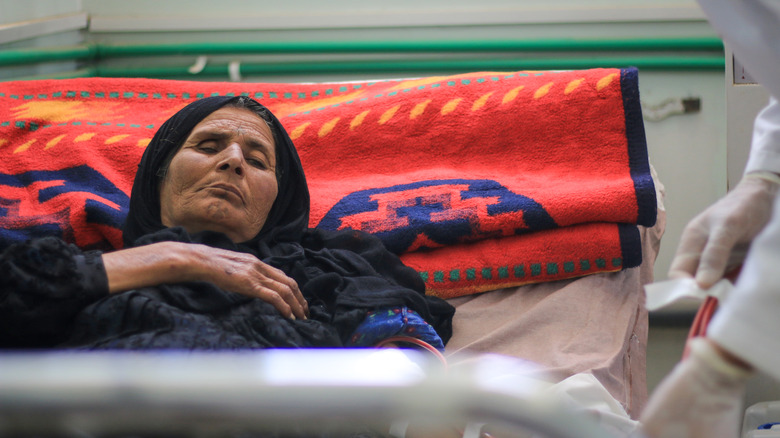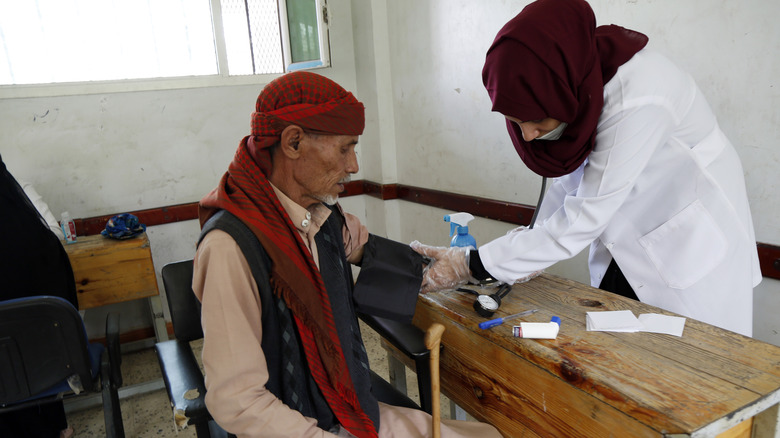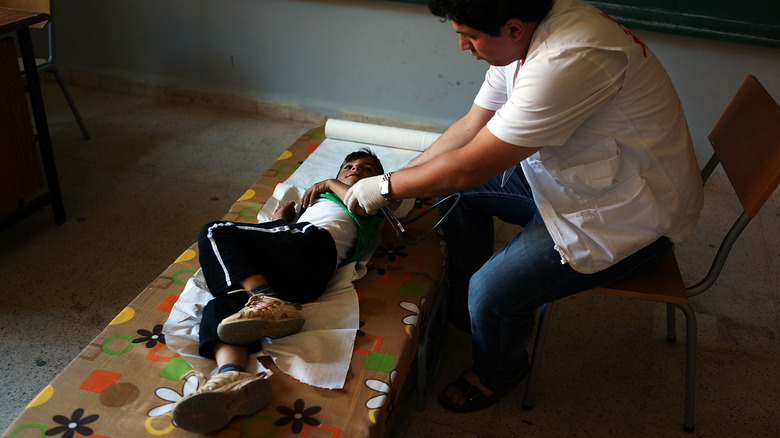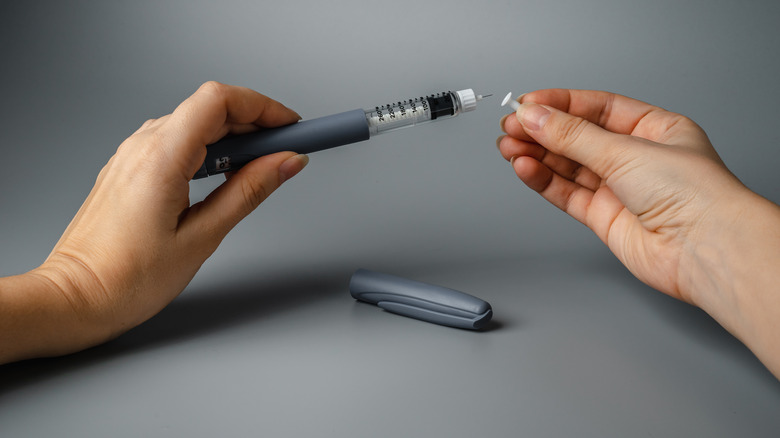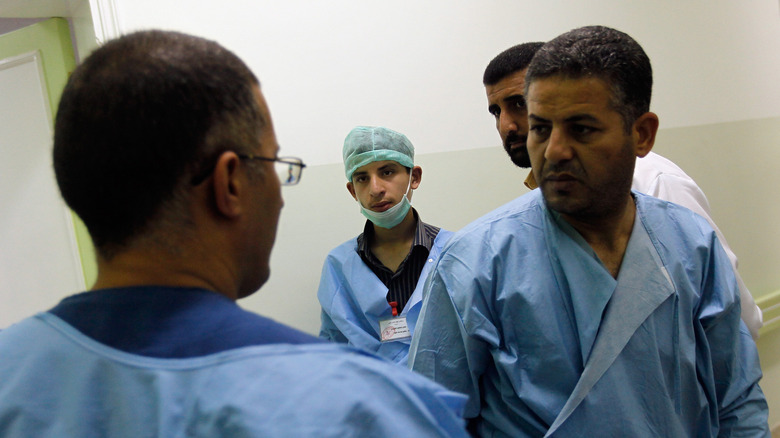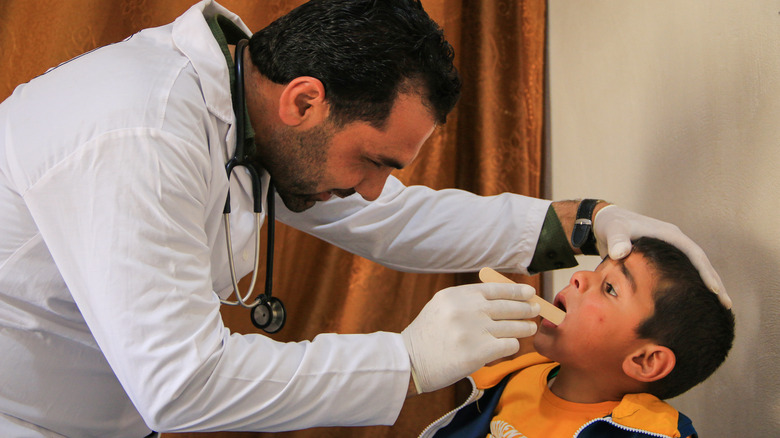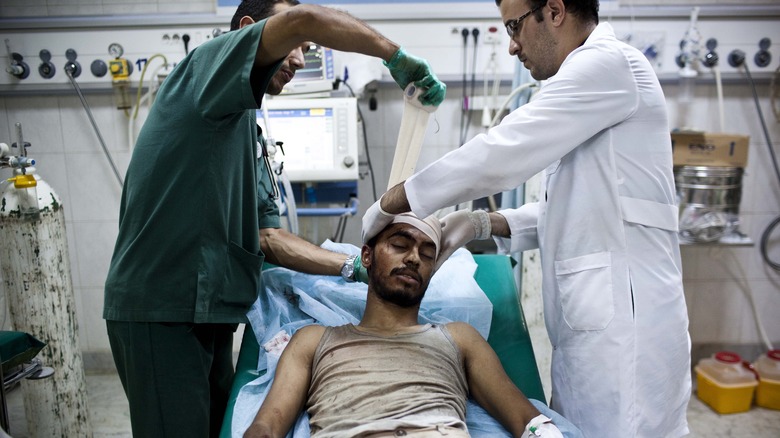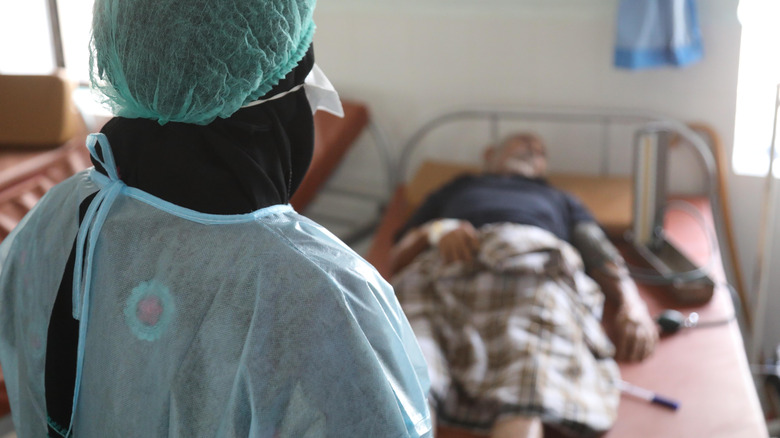What It's Really Like Being A Doctor In A War Zone
Being a doctor in a conflict zone comes with a set of challenges that can be rather tough to overcome. According to experienced British surgeon Dr. David Nott, being a doctor in war-torn Syria is extremely risky. He wrote in The Guardian, "Clinics were assigned codenames to disguise how many there really were. Ambulances carried no sirens or insignia and at night drove with their headlights off. Anything that looked like help for the injured was seen as aiding the rebels, and so a legitimate target for the regime."
Nott added that they often saw patients with gunshot wounds, including pregnant women who weren't spared by the snipers and lost their babies to war. Nott also recounted a scary incident that involved ISIS members barging into the operating room, claiming that the patient was related to one of the members. They were upset because no one asked them for their consent before deciding to perform the surgery. The doctors somehow convinced them to let the surgery take place, but Nott felt odd later and wrote that he wondered whether saving the man was the right thing to do, considering the fact that he was an ISIS member.
They have to deal with ethical dilemmas
Doctors treating their patients in a war zone are often forced to deal with ethical challenges on the job. Per The Conversation, the International Humanitarian Law states that doctors must not actively participate in "acts of war" but can turn to weapons if they need to save their patients in dangerous situations. They're also obliged to look after all patients "based on medical need" and must overlook "nationality, enemy status, religion."
Additionally, they must openly talk about "atrocities committed by either side" instead of being silent spectators (via The Conversation). Doctors who are very close to the frontline have to make incredibly difficult decisions and figure out how to save a patient. For example, if a kid needs a ventilator to survive, but there is no clarity on how medical professionals will be able to look after the child later, doctors need to think about the next steps and the most feasible scenario.
Per BuzzFeed, in the 2022 Russia-Ukraine conflict, some doctors had to save Russian soldiers who came to them in distress. The doctors did help them out, but one of them explained how confusing things were. He told the outlet, "I think we should help them, but of course, sometimes the feeling I have about it is horrible. It feels like I'm doing something wrong. Like, I can be helping my people, but I have to spend time helping that piece of s***."
They may be attacked or abducted at any point
Doctors in a war zone are acutely aware of the risks associated with working in an unstable environment. According to a Reuters report, medical professionals in Syria only spoke to journalists on the condition of anonymity because they were afraid of being targeted. A British surgeon, Abu Shamel, who helped injured civilians in Aleppo, Syria, once said in a statement, "We are forced to work in a place like this where we are exposed either to shells or artillery or tanks. We have to be among the civilians to treat them."
Another doctor in Syria admitted to Reuters that he occasionally asked himself why he ended up in such a precarious position and said, "I'm very scared for myself, but what can I do? This is my duty. I have to help how I can." Per Lit Hub, in order to stay safe, many medical professionals operated under codenames in Syria. For example, a doctor only known as "Dr. White" lost his colleague and students in the war (they were kidnapped and killed by the government forces), which prompted him to change his name again to "Dr. Abdulaziz."
Susannah Sirkin, a policy expert who is associated with Physicians for Human Rights, reflected on the plight of doctors in Syria and implied that they were mercilessly targeted. She told Stat News, "They have to make the very difficult decision every day if they're going to go into work and risk being killed, or stay home with their families, or flee."
They have to act with limited resources
One added challenge for medical professionals operating in war zones is the fact that they often have to find ways to manage without a lot of important tools and supplies (via Reuters). For instance, in Syria, doctors working inside a secret clinic didn't have access to essential tools such as X-ray machines and electricity and had to use alcohol wipes to sterilize wounds.
For Dr. Maher Saifo, working at Albairouni University's Cancer Care Center in Syria was an experience unlike any other (via OCHA). He said, "Radiation treatment is continually interrupted by power cuts, and we have insufficient diagnostic equipment, which makes it more difficult to accurately evaluate cancer stages. My biggest hope is to deliver the best healthcare and treatment to our patients."
Additionally, in Yemen, medical professionals had to confront several problems such as malnutrition and chronic health issues among their patients. A doctor posted in Yemen wrote in a piece for The Guardian, "The moments of helplessness faced by a wartime doctor are many. We know there will always be another flood of patients pouring into our hospital."
They may not be paid well for their services
For many doctors posted in conflict zones, regular salaries are hard to come by. Per a 2017 report by Doctors Without Borders, medical professionals in Yemen didn't get paid for a whole year, "bringing medical services to the edge of collapse." The non-profit organization Doctors Without Borders even prompted the Yemeni government and others to make arrangements to pay the doctors and save the medical system from suffering a complete breakdown. A medical coordinator in Yemen, Melissa McRae, said in a statement (via Doctors Without Borders), "Working for a year without pay, many are doing whatever possible to keep health services running, however minimally, while wondering how to keep their families fed, clothed, and safe."
A local doctor, Belqees Hamoud Al Khalaqi, echoed similar sentiments and said that medical professionals were working under difficult conditions in Yemen and continued reporting to work despite the fact that they weren't being paid. Why? Because they wanted to do everything possible to help other citizens in distress (via OCHA). Al Khalaqi added, "The war has affected all aspects of our life here in Yemen. Health staff here have been affected psychologically, socially and financially."
It's important to be an all-rounder
British surgeon David Nott is no stranger to war zones and has worked in different countries in order to assist those in need. The doctor spoke about what inspired him to work in war zones and told The Guardian in an interview, "The first was Roland Joffé's film 'The Killing Fields', which had a huge impact on me when I saw it as a trainee surgeon. There is a scene in a hospital in Phnom Penh, overrun with patients, where a surgeon has to deal with a shrapnel injury — I wanted to be that surgeon." Nott was also moved by footage shot in the early 1990s in Sarajevo and recalled that he saw a man picking up his daughter and rushing to the hospital only to find out that there were no doctors to assist. Nott told himself, "Right, I'm off."
Per Nott, it's essential for war doctors to be able to deal with different situations and pick up as many skills as possible. He explained (per The Guardian), "You have to know a bit of everything — neurosurgery, maxillofacial surgery, chest surgery, abdominal surgery, orthopaedics, plastics, paediatrics, how to deliver a baby." Nott also said that doctors in war zones often have to learn how to work with a patient without using high-tech tools such as CT scanners and X-ray machines.
It can be a long, unforgiving battle
According to an article by The New Yorker, the Syrian government forces were brutal and killed nearly 700 medical professionals in Syria in five years, prompting many doctors to leave the country for their own safety. Non-profit groups and local doctors had to find a way to tackle the situation and organized secret underground hospitals all over the country and even set up cameras in intensive-care units to allow doctors from other parts of the world to take a look a patients via platforms like Skype.
War doctor David Nott has trained several doctors himself and knows what needs to be done. A Syrian plastic surgeon and reconstructive surgery specialist, Abu Waseem, told The New Yorker that Nott taught his peers some crucial lessons in medicine. For instance, nobody was sure "how to cut open a chest" before Nott volunteered to teach them. Also, Nott and other doctors witnessed painful situations, such as the time when victims were attacked by snipers who seemed to enjoy playing a "sadistic game" by shooting them in the same spot multiple times in a single day. Nott told The New Yorker, "You'd know that, at the start of the day, if you got a patient shot in the right arm, you'd have six or seven more shot in the right arm." In fact, according to doctors, even pregnant ladies weren't spared by the snipers.
They rely on kind strangers for help
During the 2022 Russia-Ukraine conflict, volunteers rushed to help the injured by donating blood to hospitals in Ukraine. According to BuzzFeed, people also stopped by with medicine while restaurant owners organized food for staff members working around the clock inside hospitals. Per NBC Chicago, doctors from MedGlobal, Chicago, also left for Ukraine to help local doctors with much-needed medication, baby formula, surgical tools, and more. Many doctors decided to enter the conflict zone despite knowing that it's dangerous to do so, stating that they wanted to save as many lives as possible. A doctor from MedGlobal, Riley Jones, said, "Our level of concern is much higher than other conflict areas we've been involved in."
As reported by Reuters, the World Health Organization (WHO) also stepped up to the challenge and sent ventilators, medication, emergency surgery kits, and more to doctors treating civilians and soldiers in Ukraine. There are also examples of doctors like oncologist Nataliia Verovkina who rushed to Germany with her son when the conflict began. After ensuring that her child would be okay with his grandparents, she returned to Ukraine to help. Verovkina told Reuters, "Someone had to help these people. It was harder for me to do nothing."
They have to deal with unexpected challenges
Doctors have to be equipped to handle unprecedented challenges in conflict zones. During the 2022 Russia-Ukraine war, patients with Type 1 diabetes struggled to cope without regular access to insulin at the country's medical centers and hospitals. Chair of the Ukrainian Diabetes Foundation, Valentina Ocheretenko, said that the "situation was dangerous" for patients with diabetes and that she was working hard to make arrangements for insulin and glucose meters from other countries. She told Reuters, "I fear for people with diabetes, it's too much." In fact, Ocheretenko said that her daughter has Type 1 diabetes — she had to be taken to the hospital after she experienced a "dangerous episode of hypoglycemia." Her blood sugar levels were rather low because she was unable to get enough food to keep herself going.
Additionally, doctors in Ukraine were increasingly worried about the rise of infectious diseases — including COVID-19 — as people continued to try and leave Ukraine in large numbers (via CNN). Kate White, an emergency program manager at Doctors Without Borders, told the outlet, "In terms of what we call vaccine-preventable diseases, the status in Ukraine was that the population was not vaccinated to the extent which you would get herd immunity like you would in many other European countries or in the US." Additionally, low levels of sanitization during the war and a lack of electricity and access to clean water could make things worse for people and leave them more susceptible to infectious diseases.
They need to display confidence
As far as British surgeon Dr. David Nott is concerned, it's crucial for doctors to look like they've got things under control even when they're working in a conflict region and tackling massive challenges on a regular basis. In his book, "War Doctor: Surgery on the Front Line," Nott wrote that it takes a lot of time to "build up the skills and experience necessary to cope" with the different situations that a trauma surgeon will encounter on the job.
According to Nott, patients with devastating injuries in war-torn areas are often terrified and need reassurance from a doctor that everything will be okay. Nott added, "The initial doctor-patient relationship must provide that, and instill a feeling of confidence that the doctor will be able to help and do the right thing, and take away the pain of injury." He said that doctors need to be able to adapt to the situation and be strong and seem confident even while dealing with seemingly impossible tasks.
The stress can be very tough to manage
Being a war doctor is undoubtedly a tough job that can feel incredibly taxing. Per BuzzFeed, during the 2022 Russian-Ukraine war, one of the doctors posted at a local hospital said that he didn't leave the hospital for five days in a row at one point and only managed to sleep for a short period. While the doctors didn't have much to do in the initial days of the war, things escalated rather quickly, and medical professionals started prepping for patients, installing extra beds, and cleaning hospitals. Sure enough, on the third day of the war, fighting had drastically increased, and patients started visiting the hospital in large numbers. According to a Ukrainian doctor, their hospital ended up sending patients with less serious injuries to other hospitals or advised them to recuperate at home.
Per Dr. David Nott, it doesn't hurt to remember that war zones are nothing like the working conditions elsewhere, and it's important to not lose focus or get disillusioned at work. He wrote in his book, "War Doctor: Surgery on the Front Line," that it can be fairly easy to "become blinkered and not to take care of oneself," but doctors shouldn't take things lightly and should always take precautions. He explained that individuals entering the hospitals weren't always checked for weapons in Syria and wrote that his team had to "deal with whoever came in," no matter who they were.
They have to confront heartbreaking situations
According to The New Yorker, there are times when all members of a particular family have to be taken to the hospital after a devastating bomb attack. In Syria, Dr. David Nott once saw five siblings at once, badly injured and struggling to stay alive. Helpless and certain that he won't be able to save their lives, the doctor started recording the incident to spread awareness about how awful the war has been for innocent civilians stuck in Syria. As Nott watched one of the kids taking his last breaths, he held the child's hand. Nott said, "All you can do is just comfort them."
An Egyptian neurosurgeon, Omar Ibrahim, has worked in Syria for several years — for him, it's incredibly difficult to watch children suffer and live with the knowledge that he cannot help them (via NPR). He said, "In most bombings you see one or two children with severe brain injuries. I have [seen] hundreds [of children with brain injuries] ... It is very sad to see them and [know] you cannot help save their lives."
They have to make sacrificies
For many doctors working in war zones, it's difficult to visualize what their lives may look like in the future. A plastic surgeon from Syria, Abu Waseem, let go of his dreams to focus on saving lives and knew that it would now be impossible for him to continue his studies and earn a degree as a specialist in Syria (via The New Yorker).
Waseem didn't even have a passport and couldn't go anywhere for a brief break like his colleagues, who would try to spend time with their family members and had started living in other countries like Turkey. Waseem trained under Dr. David Nott and once told him that he was okay but sad because he treated a child with devastating injuries that would trouble her for the rest of her life. Waseem wrote (per The New Yorker), "Look at this girl. This is one of the victims of a Russian bombing today. She lost her whole arm and her face."
Meanwhile, a doctor in Yemen, Nabila Ali Saleh, used to walk for a couple of hours to get to the health center where she was posted at the beginning of her career. She admitted that it was tough, but told UNICEF that she needed to do it "to acquire sufficient experience." She added that she doesn't go on holidays and spends her days helping individuals recover from illnesses and supporting pregnant women by hosting them in her home "so they can give birth in a safe environment."

